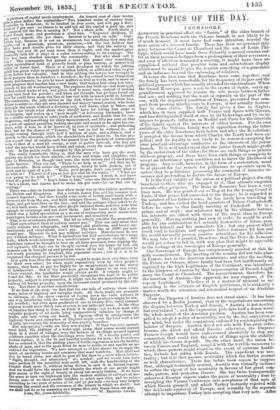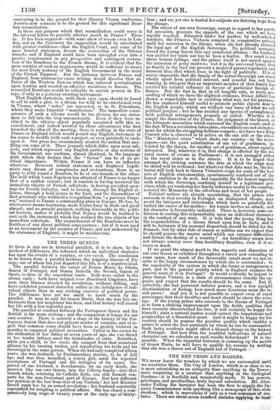TOPICS OF THE DAY.
FROHSDOILF.
ALTHOUGli in practical effect the " fusion" of the elder branch of the French Bourbons with the Orleans branch is not likely to be of much moment, it must have bad some intention, beyond the mere union of a severed family. There has been no personal inti- macy between the Count de Chambord and the son of ',ogle lippe, which could have made these distantly removed cousins suf- fer in their personal feeljpgs from a prolongation of their severance ; and even if affection demanded a meeting, it might have been ao- complished without that peculiar form and ostentatious display w)iich must be meant to give the reunion something of a guarantee and an influence beyond the embracing of relatives. It is not the first time that Bourbons have come together, and the family has been remarkable for the frequency of its jars and the political purpose which has usually attended its combinations. When the Grand Monarque gave a son to the crown of Spain, royal ag- grandizement appeared to remain the sole nexus between father and son; and nothing but the want of capacity on the part of the son, with the disjointed condition of France, prevented that com- pact from proving mischievous to Europe, if not actually destruc- tive to some states. The family has given a line to Naples; which has in turn supplied both France and Spain with Queens, and has distinguished itself at once by its bickerings and by its in- trigues to promote influence in Madrid and Paris for the interests of the family against the interests of either nation. For its own ambitions, the Orleans family was in opposition during the latter years of the elder Bourbons, both before and after the Revolution; it accepted the throne from which Charles the Tenth had been ex- pelled; and its loyalty is not likely to be renewed excepting for sonic practical advantage conducive to the interests of the junior branch. It is well understood that the junior branch might profit by the restoration of the elder; for there are such things as princes without progeny, and there have been such things as compacts to accept an inheritance upon condition not to incur the likelihood of progeny. Any result, however, in the form of a restoration, must be at present far too remote for politicians to speculate upon it, unless they be politicians possessing the command of immense re- sources and pretending to dictate the future of Europe. It is the very futility of the union as a political project directly beneficial to those who are engaged in it, that attracts suspicion towards other purposes. The Duke de Nemours has been a very busy man. He was pointed out as Regent for the young Count of Paris, if-that prince had succeeded to the throne ; he is regarded as the astutest of his father's sons; he has lately been travelling in Turkey, and has visited the head-quarters of Prince Gortschekoff, before he came to this family meeting at Frohsdorf. He is a prince out of work ; and whatever may be his ultimate fortune, his interests arc allied with those of the royal class in Europe generally. Having nothing just now at stake, he would be avail- able for any combination not actually destructive of future pros- pects for himself and his immediate kin ; but any project which could tend to facilitate and expedite better fortunes for him and his would naturally possess positive attractions for his adhesion. We may take it for granted, therefore, that the Duke de Nemours would not refuse to fall in with any plan that might be agreeable to the feelings of the Sovereigns of Europe generally. One Sovereign of Europe has conspicuously assisted at this fa- mily reconcilement. The meeting of the cousins did not take place in France, but in the Austrian dominions; and after the meeting, the Prince of Orleans, whose family had been but indifferently re- cognized by the high Legitimists of the Continent, was introduced to the Emperor of Austria by that impersonation of French Legiti- macy the Count de Chambord. The reconcilement, therefore, has the sanction of Austria—the approval, we may suppose, of Eu- ropean Legitimacy. Whether it is a matter of moment or not according to the estimate of English politicians, it is evidently a matter worth the attention and ceremonial respect of an Austrian Emperor. Now the Emperor of Austria does not stand alone. It has been observed by a Berlin journal, that in the negotiations concerning the dispute between Turkey and Russia, " Austria is not neutral, but neutralized"; and the expression puts into half a dozen words the whole moral of the Austrian position. Austria has been com- pelled to adopt a policy of neutrality, not by the free conviction of her mind, but under the compulsion enforced by contemplating the balance of dangers. Austria dared not side with European order, because she dared not offend Russia ; otherwise, the Emperor Francis Joseph would have endeavoured absolutely to stop any commotion that could risk the state of things upon the stability of which his throne depends. On the other hand, the union be- tween France and England, coupled with the terrible measures to which those powers might resort in the event of extreme hostili- ties, forbade her siding with Russia. The expedient was neu- trality ; but it is that passive neutrality which the Berlin journal so well characterizes. There has before been reason to suppose that, although technically neutral, Austria was virtually inclined to soften the rigour of her neutrality in favour of her great com- rade, patron, and protector, Russia. She has twice transparently subserved Russian objects under the guise of neutrality ; first by inveigling the Vienna Conference into acceptance of that note at which Russia grasped and which Turkey instantly rejected with the deliberate approval of Europe, and secondly by the separate attempt to importune Turkey into accepting that very note. After
consenting to be the ground for that illusory Vienna conference, Austria now consents to be the ground for this significant Bour- bon reconciliation.
Is there any purpose which that reconciliation could serve in the interval before its possible ulterior result in France? There is. It has been supposed—with some show of reason even in Lon- don, and on the Continent the supposition would be entertained with greater confidence—that the English Court, and some of its most trusted statesmen, favour the restoration of the Orleans branch ; and if England could have been inveigled even into a passive acquiescence in any prospective and contingent restora- tion of the Bourbons to the French throne, it is evident that the mere surmise of such an acquiescence would be sufficient to create the most lively jealousy of the English Government in the mind of the French Emperor. But the jealousy between France and England, from whatsoever cause arising, would dissolve that al- liance of the Western Powers which has enforced neutralization upon Austria and created an effective resistance to Russia. The reconciled Bourbons would be valuable to certain powers in Eu- rope, if only as a jealousy-creating instrument.
That English statesmen, with their eyes open, should be found to aid in such a plot, is a dream too wild to be entertained even in Vienna, where " notes" are concocted, or in St. Petersburg, where they make Imperial " manifestoes." The immediate conse- quences of such a scheme would be too obvious for any states- man to fall into the trap unconsciously. Even if they were in- clined to the ulterior object popularly associated with this re- concilement, and indeed avowed by those adventurers who first broached the idea of the meeting, there is nothing in the state of France or England which would permit any English statesman in his senses to meddle with such a project, or even passively to smile upon it. Our press has unanimously scouted the notion that any- thing can come of it. Those journals which differ upon most sub- jects, and which represent any English parties or any sections of the Government, are uniform, almost identical, in the language with which they declare that the "fusion" can be of no po- litical importance. Within France it can have no influence whatever. However retired statesmen and displaced Legiti- mists may dream of conspiracies and restorations, there is no party to rally round a Bourbon, be he of one branch or the other. The hold which Louis Napoleon has obtained of France is no longer that of a sudden seizure ; but it consists in having mastered the immediate objects of French solicitude, in having provided open- ings for French industry, and in having, through the English al- liance, through a bold course in the East, and the discomfiture of that potentate who withheld a recognition from " a parvenu Empe- ror," restored to France a commanding place in Europe. He has, by whatsoever means beginning, made France busy in trade and great abroad ; and no present prospect, nothing discernible in the politi- cal horizon, makes it probable that France would be inclined to cast aside the instrument which has realized the two objects of her immediate solicitude. The reconcilement of the Bourbons must be fruitless of any direct political consequences ; but if it were used as an instrument by the enemies of France, and not understood by the statesmen of England, it might be mischievous.



























 Previous page
Previous page